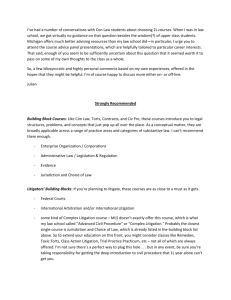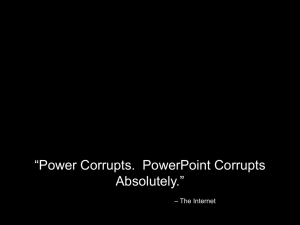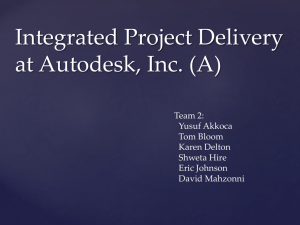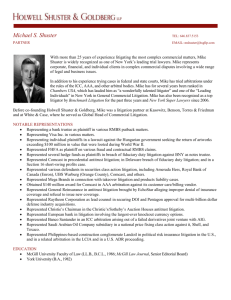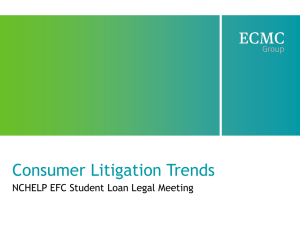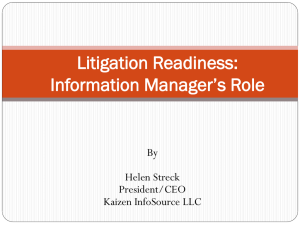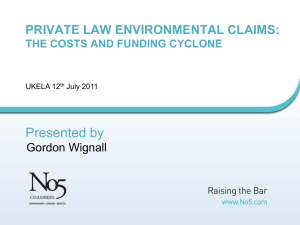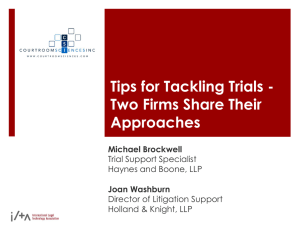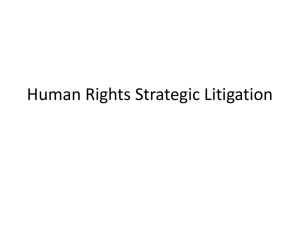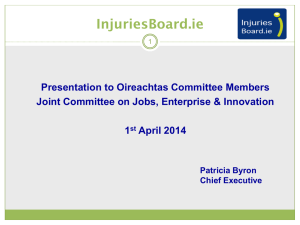Presentation in format
advertisement
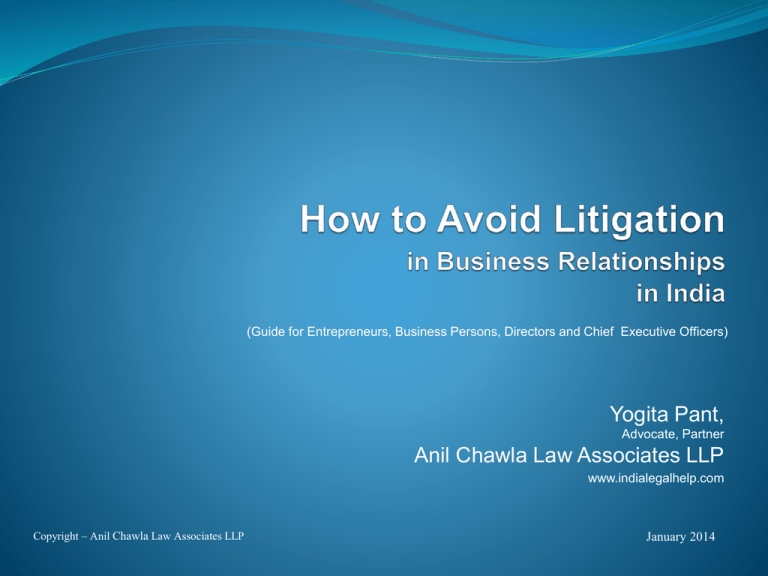
(Guide for Entrepreneurs, Business Persons, Directors and Chief Executive Officers) Yogita Pant, Advocate, Partner Anil Chawla Law Associates LLP www.indialegalhelp.com Copyright – Anil Chawla Law Associates LLP January 2014 Why avoid Litigation? Litigation is a waste of time, money and energy Litigation consumes Top Management Attention – the most scarce resource Litigation is inherently unpredictable. You may lose even though you have a strong case. India is especially notorious regarding judicial delays Almost every major case in India travels up to Supreme Court, which means a very-very long and expensive process Even when you win a case, you lose a relationship Reputation as a litigation-inclined party scares away potential associates and collaborators www.indialegalhelp.com 2 Why does litigation happen? Miscommunication Poorly drafted contract document Different interpretations of the parties as to the agreed terms Different understandings of the parties as to the law Bad intentions of one party (or both parties) In Government and large organizations – someone does not want to take a decision and wants a court order to save his / her back Ego Greed Revenge Lawyers and law officers are not interested in avoiding litigation. They earn their bread, butter and power from litigation. www.indialegalhelp.com 3 Fundamental Principles of Litigation Avoidance Prevention is better than cure Always nip trouble in the bud A bird in hand is better than ten in the bush (Rs. 100,000 settlement at the moment is better than a claim of Rs. 1000,000) Discretion is the better part of valor (There are times when avoiding an argument / suit is the wise and brave thing to do) Choose the battles you fight (Losing a few battles is good) Cut your losses as quickly as possible. (Do not throw good money after bad) Do use a lawyer, but do not leave everything to the lawyer (Lawyers, like all human beings, may be biased or stupid or crooked or negligent or all of these) www.indialegalhelp.com 4 Actionable stages for litigation avoidance Choosing with whom to do business Courtship stage – getting to know each other Engagement – laying the foundation for future Marriage - cementing relationship with a contract Working together First signs of discord Full-blown dispute needing intervention Separation, Divorce, Claims and Counter-claims More care at the initial stages leads to the latter stages being smooth and painless. Professional assistance committed to avoid litigation can add value at each stage. Always avoid consulting a litigation lawyer. As Warren Buffett says, “Never ask a barber if you need a hair cut”. www.indialegalhelp.com 5 Choosing the right person No lawyer / court / contract can protect you from a professional scoundrel A criminal is a dangerous person. Never think that you can outsmart a criminal with the help of your lawyer etc. Always look at past record including litigation history of your potential partner / associate / supplier / customer Get as many references as possible If a person / proposal looks very attractive, get suspicious Appearances are deceptive. Do try to look below the surface. Get professional help in conducting background checks, due diligence etc. to improve your chances of avoiding a fraudster Never ignore small worrisome signs www.indialegalhelp.com 6 Courtship Stage Be honest, sincere and forthright – remember your straightforwardness will inspire other person to do the same If your sixth sense smells dishonesty, false appearance, big promises of the moon or a shady person, drop the relationship without a second thought Let interaction take place with multiple persons at various levels of the two organizations – sometimes lower staff will detect shadiness better than top management If possible, create formal structured avenues for multiple level interactions Top management must avoid falling in blind love – this gives wrong signals to juniors who start singing love-songs to please bosses www.indialegalhelp.com 7 Engagement – foundation laying Often defined by a MOU (Memorandum of Understanding) or Letter of Intent or some such document Documents like MOU have low legal enforceability so avoid excessive exposure at this stage MOU should lay roadmap for future, defining roles and responsibilities; also agree on milestones to be achieved before taking relationship to next level MOU should define next level of relationship MOU should have an easy exit route for both parties – painlessly and without bitterness MOU should be crisply worded, unambiguous and have minimum gray areas www.indialegalhelp.com 8 Marriage - cementing the relationship Desire to forge a medium / long term relationship - essential prerequisite Highly advisable to have a legally enforceable and binding document, which makes clear every aspect of the relationship Roles and responsibilities defined in MOU should be revisited, analyzed, modified (if so felt) and more sharply defined Often such a marriage leads to the birth of a baby or a Joint Venture (JV). In such cases define the structure of the new JV. Be extremely clear about who brings what and who gets what in terms of money, manpower, resources, expertise, control etc. Document defining the relationship is important, but it is like a lock on your house – good for decent people but no protection against hardened criminals www.indialegalhelp.com 9 Marriage Document Essentials Document may be Agreement / Contract / Partnership Deed or some other form Must be meticulously drafted detailing roles, responsibilities as well as do’s and don'ts at each stage of business cycle Investments and Shares in benefits / profits must be clear and explicit Try to imagine all possible scenarios and reactions to the developments Do think of divorce at the time of marriage – include dispute resolution and exit route for all parties Post separation scenario should be agreed and penned down www.indialegalhelp.com 10 Agreement Desirables Simple language with no jargon – remember, a court does not understand jargon Cover all possible aspects and scenarios Avoid “Standard” Agreement formats as each relationship is unique Avoid complex document that you cannot understand Ask a third person with NO knowledge of law to read the draft document; If he / she finds it difficult to understand, simplify it till a common person with reasonable intelligence can make sense of it Try to create a “Win-Win” relationship Try to be fair and just in spirit as well as words Do use professional help, but remember – A relationship is too important to be left to a lawyer (since lawyer is the one to benefit when the relationship falls apart) www.indialegalhelp.com 11 Working together Define who in your organization is responsible for taking the relationship forward – prime mover of the relationship Delegate roles and responsibilities (as defined in Agreement) internally – let the other side also know Communicate and encourage communication at multiple levels internally as well as with the other side Create structures for communication, coordination and monitoring Stress on schedules – delays are the first signs of brewing trouble Analysis of delays to be taken up at highest level mutually Keep smelling for ego clashes and nip such clashes in the bud Do not push disagreements under the carpet – handle them with diplomacy, tact and firmness as soon as they appear. Understand and appreciate the other side’s concerns Always be willing to lose a battle to win a war (Winning arguments is futile) www.indialegalhelp.com 12 First signs of discord Delays in decisions / actions Unfulfilled commitments / promises Ego clashes at junior / mid-management level Jokes in the grapevine making fun of other side officers Small skirmishes on trivial issues are too frequent Basic assumptions that led to the relationship have turned wrong Communications have fallen to very low level or show stiffness Get to the root of the problem. Either solve the problem or redefine the relationship. In extreme cases, amicable exit from the relationship at this stage may be the best option. www.indialegalhelp.com 13 Full-blown dispute needing intervention It is never too late to try for an amicable settlement Try to use someone who can bring about informal reconciliation If the agreement provides for formal reconciliation process, start the process in right earnest If reconciliation fails, go for arbitration if agreement has arbitration clause. Arbitration is a semi-judicial process. A settlement with / without reconciliation cannot be challenged; Arbitration award can be and is often challenged in High Court. Arbitration + Appeal in High Court + Appeal in Supreme Court can take up to fifteen years. So keep trying for settlement at each stage of the process. www.indialegalhelp.com 14 Separation, Divorce, Claims and Counter-claims Remain focused on business Look ahead into future Do not let the failures of past leave bitterness in your mind Do not let negative emotions like revenge cloud your decision Do a cost-benefit analysis of any action(s) while including cost of management time and opportunity lost during litigation Drop the claim if the cost of getting a claim is more than the claim Instead of monetary claims, focus primarily on salvaging intangibles like your reputation, goodwill, relationships, brand value, intellectual property rights, peace of mind etc. www.indialegalhelp.com 15 Summing up Be very careful in choosing the parties with whom you do business Spend time to find more about your potential associate / partner Start with some activities that build mutual understanding and confidence Move into long-term or deeper involvement with caution At each stage of relationship, prepare clear documents that leave no room for misunderstanding While in the relationship, take all possible care to avoid derailment If things go wrong, try for amicable resolution of problems If amicable resolution not possible, try for exit by mutual consent www.indialegalhelp.com 16 Hope that you found it useful! Please feel free to contact us for help with litigation avoidance. E-mail info@IndiaLegalHelp.com For more such presentations and articles, please visit www.indialegalhelp.com ANIL CHAWLA LAW ASSOCIATES LLP is a partnership firm incorporated with limited liability under The Limited Liability Partnership Act, 2008 of India (LLP Identification No. AAA-8450) having its registered office at MF-104, Ajay Tower, E5/1 (Commercial), Arera Colony, Bhopal – 462 016, INDIA
